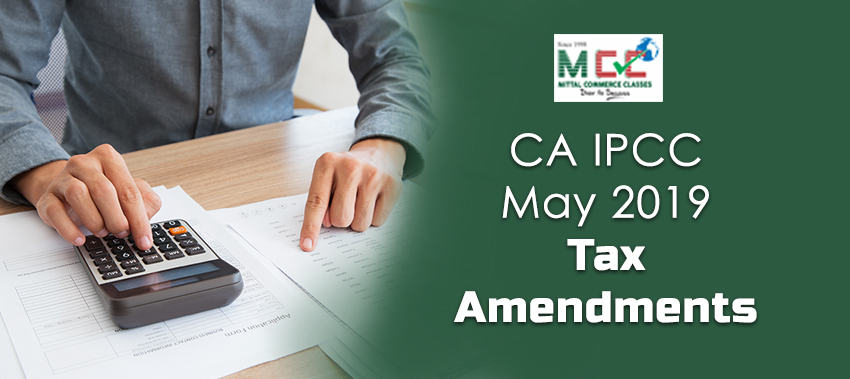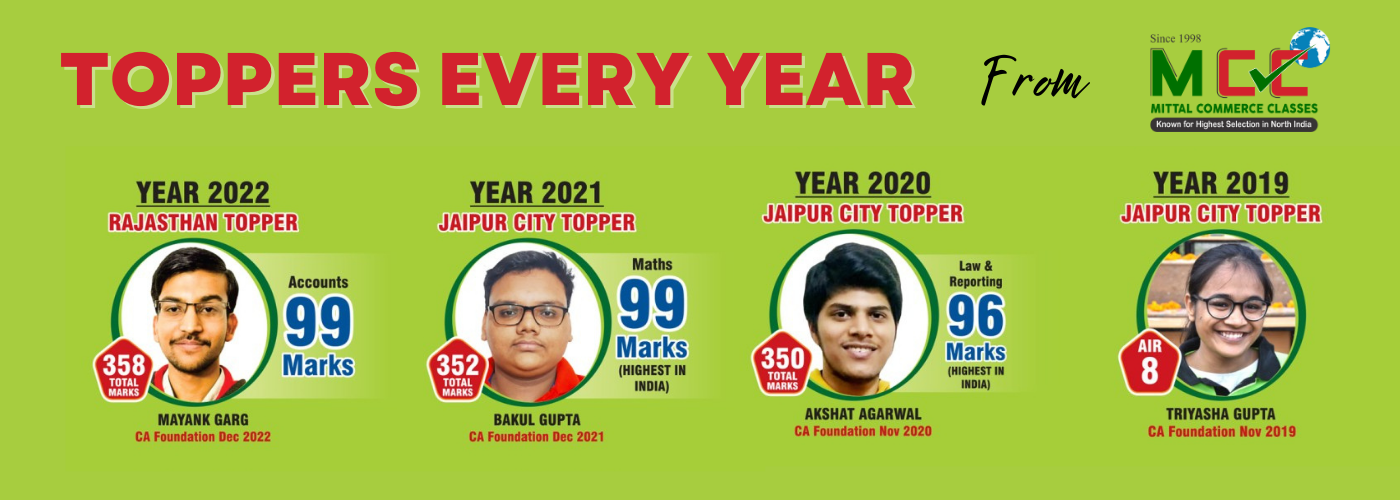There are Tax Amendments in the syllabus of CA IPCC November 2018. Here we are trying to list all tax amendments in IPCC November 2018 for the students appearing in November 2018 exams.
Amendments in the Capital Gain
Amendments Related to the Holding period of Capital Asset
There are some amendments in the Holding period of Land and Building which has been reduced to 24 months from 36 months.
| Capital Asset | Holding Period to be termed as Long term |
| Land and Building | 24 Months or more |
| Unlisted Shares | 24 Months or more |
| Units of Equity Oriented Mutual Funds and Securities | 24 Months or more |
| Listed Shares | 12 Months or More |
| And Other Capital Asset | 36 Months or more |
- Under Section 10(38) of Income Tax Act, 1961 Long Term Capital Gain on equity shares is exempt but subject to the following conditions –
- Is these shares were purchased after 1/10/2004, then STT must have been paid on such.
- Although these conditions are not applicable to the acquisition of IPO, Follow-on IPO, Right Issue or Bonus issue for which separate notification would be issued by Government.
- A new provision has been inserted u/s 45(5A) to provide a relief for the Individuals or HUF who has entered into JDA (Joint Development Agreement) for their property (Land / Building) with the builders or developers. Earlier capital gain tax liability arises in the hands of owner as soon as they entered into the JDA with the Builder. In order to overcome such issues new provisions u/s 45(5A) has been inserted with the below mentioned conditions-
- Owner of the Land and the builder or developer should be entered into a registered agreement, to develop real estate on the land and building or both or part in cash.
- In such a case, capital gain tax liability will arise in the hands of the owner in the previous year in which the certificate of completion for the whole or part of the project is issued by the competent.
- Stamp duty for the purpose of charging capital gain shall be taken of the date of issue of completion certificate.
- For the computation of Capital gain base Year has been switched from 01/04/1981 to 01/04/2001.
- Section 56(2)(x) for the Firms / AOP and Widely held Companies
New Finance Act has introduced a new section in place of sec 56(2)(vii) which covers AOP, are liable to pay tax on the difference between FMV and the actual consideration of movable or immovable asset. Although, partition in HUF, transaction between relatives and trusts are still excluded from its scope.
- Limit of Rs 2,00,000/- fixed in respect set off of interest of House Loan with other Heads
Earlier, set off housing loan in respect of let out property from the other heads were allowable without any limit. But Finance Act 2017, now has introduced a limit of Rs 200000/- for the adjustment of House property loss to be set off against the other head income and the balance would be allowed to carried forward for a maximum of 8 years. But such carried forward would be allowed to set off against “Income from House Property” without any limit.
- Restriction on Making Corpus Donation u/s 10(23C)
- Trust registered u/s 12A or 12AA modifies its objectives then it would required to apply for a fresh application within 30 days of such modification of its objective.
- w.e.f 01/04/2017, a trust registered u/s 12AA or 10(23C) will not be permissible to make any “Corpus Donation” out of its income to any other registered trust u/s 10(23C) or 12AA. From now, these donations would not be treated as “Application of Trust”.
- If the income of trust before making any deduction exceeds the basic exemption limit for now it is Rs 2,50,000, then such trust is required to file income tax return.
- Finance Act has made a drastic change in respect of trust which says that trust will not be able to claim the benefit u/s 11 and 12 if they file ITR after the due date given u/s 139(1).
- Deemed Annual Value to be taken Nil in respect of vacant flats by builder
Finance Act 2017 clarify this, which says that any property which held as stock in trade and also not let out either whole or any part of the previous year, “Deemed Annual Value” of such property is taken to be NIL for a period of 1 year from the end of the FY in which certificate is issued by the competent authority on completion of construction of property. Earlier, Deemed Annual Value of vacant flats owned as a stock in trade was under dispute.
- FMV to be deemed consideration in case of Unquoted Shares
New section 50CA by the Finance Act, 2017 in respect of the unquoted shares, Fair Market Value is deemed to be the full value of consideration if the FMV is higher than the actual sale consideration on the date of sale of shares. Now, buyer and seller both would have to pay the tax on difference of the FMV and the actual consideration.
- Limit of Rs 20000/- reduced to Rs 10000/- u/s 40A(3)
w.e.f 01/04/2017, limit of cash payment in respect of revenue expenditure has been reduced to Rs 10000/- from Rs 20000/- per day and per person. Although the limit of Rs 35000/- in respect of transporter continues to be same. Cash payment includes payment other than Account Payee cheque / draft, NEFT, RTGS, credit and debit cards.
- Limit of cash payment in respect of Capital Assetby Sec 43(1)
w.e.f 01/04/2017, any payment made in cash against acquisition of asset would be cover by Sec 43(1). With this introduction, cash payment exceeding Rs 10000/- per day per person would not be allowed as a cost for the purpose of depreciation and neither it would be considered as a cost at the time of sale. Earlier, there was no such restriction for the payment of cash in respect of acquisition of asset, this limit was set only towards revenue expenditure.
- Limit of Audit u/s 44AB
Assesses other than Company and LLP who are filing their return u/s 44AD or Sec 44ADA are not required to get their books of accounts audited u/s 44AB if their turnover does not exceed by Rs 2 crores and Rs 50 Lakhs respectively. Although company and LLP are required to get their books of accounts audited in case their turnover exceeds Rs 1 crore.
- Reporting of Cash Payment in Excess of Rs 200000/-
Assessee covered under tax audit u/s 44AB is required to report cash payment in excess of two lakhs in a separate form 61A for the sale of Goods or Services per transaction during the preceding F.Y. 01/04/2016 – 31/03/2017 up to 31/05/2017. Any delay would attract a penalty of Rs 100/- per day.
- Limit for the Maintenance of Books of Accounts u/s 44AA
w.e.f. 1/04/2017, the Individual or HUF who are not covered by the presumptive taxation scheme in which they have to pay 8% or 6% of the T/O or 50% in case of gross receipts (professional) and income of which is likely to exceed Rs 150000/- and Rs 2500000/- are required to maintain books of account.
- 8% reduced to 6% in case of Electronic Clearing System u/s 44AD
Under section 44AD, those assessee who received the payment of sales through the electronic clearing system either by account payee cheque or bank draft during the year or before the due date of furnishing of return u/s 139(1) will be required to pay tax @ 6% instead of 8%. To avail this lower rate benefit, assessee will have to maintain the separate records of cash sales and bank sales.
- Dividend taxable in excess of Rs 10 Lakhs
w.e.f 01/04/2017, dividend received by all assesses except domestic companies, trust registered u/s 12A and institutions eligible u/s 10(23) in excess of 10 lakhs would be taxable @ 10% in excess of Rs 10 Lakhs. Before the amendment, only resident individual, HUF and Firm were covered in this section.
- Delayed Filing of ITR Individual and HUF
Who are not covered u/s 44AB are required to file their ITR before 31st July and others are required to submit it before 30th Sep as per Sec 139(1). If any return filed after such date would attract a penalty.
- Filled up to 31st Dec – Rs 5000/-
- Between 1st Jan to 31st March – Rs 10000/-
- Donation not eligible if paid in cash in excess of Rs 2000/-
- Provisions relating to Transfer Pricing in case of transactions with related persons
Amendments in the Tax Rate for Financial Year 2017-18
- There is no amendments in Slab Rate. Income up to 2,50,000 is covered under Basic Exemption limit. Finance Act, 2017 has brought a change in the tax rate from 250000 to 500000.Income above 250000 up to 500000 will be taxable at the rate 5% which was earlier 10%.
- With the reduction in tax rate, Finance Act, 2017 has also introduced a change in the rebate u/s 87A which has reduced to Rs 2500/- from Rs 5000/- per year having income up to Rs 3,50,000 which was earlier Rs 5,00,000.
- The government has also introduced a surcharge for the individuals having income above Rs 50 Lakh and limited to Rs 1 Crore at the rate of 10%. However, surcharge for the income above Rs 1 crore will be 15%.
- As far as companies are concerned, tax rate would be limited to 25% for the Financial Year 2017-18 where the total turnover or gross receipts does not exceed 50 crore during the Financial Year 2017-18.
















